Not everyone has a pretty garden, but you shouldn't be discouraged from gardening. New fruits, vegetables, herbs, and flowers will make the yard healthier, plus you'll be better off on a budget. But if you're a first-time gardener, there are a lot of things you have to know before you can plant. Here are 21 specific gardening tips to start your home garden.The following content also has some reference value for raised garden beds.
- Beginner gardening tips
- The 100 Best Gardening Tips and Tricks
So let's get started,
Beginner gardening tips
Let's take a look at 21 simple gardening tips for beginners.
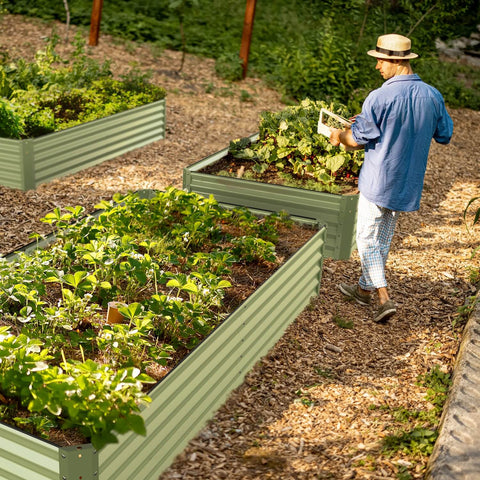
- What do you choose to plant
Effective gardening starts with knowing which plants are viable where you live. Packing seeds and plant labels will tell you what grows best in your field.
In their garden at home, some people like to grow vegetables. Others may be more interested in transforming their yard with beautiful flowers. Still, most people prefer to grow flowers, vegetables and fruit in their garden as a total solution. First, define your goals and choose the plants you want to grow on your land.
A more useful piece of information is the length of the growing season. This is an annual cycle during which temperatures remain above freezing day and night. Knowing the growing season is especially useful for growing annuals, such as most vegetables in the garden and some flowers that only grow for one year.
- Choose the best place to grow
Being aware of what you want to grow will give you a better idea of the best location to have a garden in your yard. Some plants prefer direct sunlight, while others prefer shade.
- Test the soil
Use a home soil testing kit to test the pH levels of your land or send samples to a lab to make sure your soil is safe enough to grow plants. Most fruits and vegetables (except melons, potatoes, and eggplants) will tolerate different pH levels, but usually between 6.5 and 7.
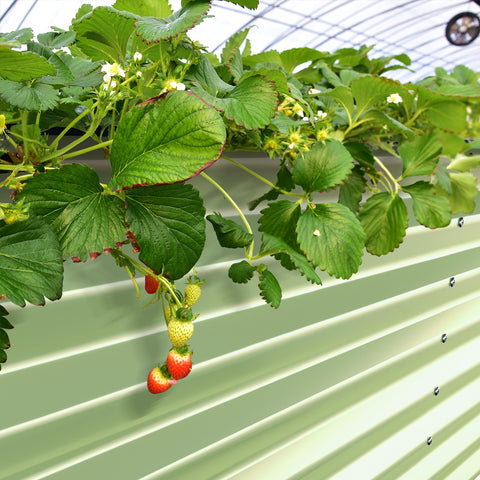
Testing soil nutrients is a key step in effective gardening. In addition, testing these different nutrients, including potassium, nitrogen and phosphorus, is also essential in this step. If your test results are incorrect, you will need to spend some time fixing the defect.
- Think raised garden beds
When you're new to gardening and you want to set yourself up for future success, a raised garden bed may be the smartest way to do it, even if it may require more work upfront.
In a raised garden bed, you have better control over the soil and easier control over weeds and pests. Most garden-service experts also advise inexperienced gardeners to build raised beds. They are very helpful in separating plants as needed. You will grow a variety of plants in the raised bed, all concentrated in their own areas.
- Design the basic structure of your garden
Now that you know how your soil looks, what kinds of plants you can grow, and where you'll put your new garden, take some time to design it before you get to work. It will allow you to double check the space for proper optimization.
- Get some equipment
In the modern world, plenty of equipment and infrastructure can make your garden activities more effective. But they don't need a lot of resources or a lot of investment. You don't need all kinds of equipment to be a gardener, but gardeners do need some important equipment.
Without the necessary equipment or kit, you can easily get into a serious mess. Breathable and waterproof gloves, pruning tongs, scrapers, hand spades, spades, rakes, hoes, garden forks, hoses with adjustable nozzles, watering sticks or buckets, and wheelbarrows are some of the important items.
- Don't forget to use a seed starter kit
Using a seed pack, this is an easy and almost guaranteed way to get your plants to germinate. These single or multi-purpose trays provide optimal germinating conditions for your seeds.
This can help you start the process indoors when it is too early to plant outdoors, and then plant it into the wild when it is good enough.
- It may be beneficial to label plants in your garden
Even if you only plant many different seed forms, it's a good idea to mark what they are and where to plant them.
- Use a planting partner
Growing a variety of crops together in the same area serves several purposes, including optimizing space use, providing nutrients and preventing pests.
For example, tomatoes (when they co-exist with basil) are more productive, repel mosquitoes, and fly away. Asparagus, cabbage, calendula, parsley, spinach, celery, onion and lettuce are all tomato Allies. Try to mix tomatoes with beets, corn, fennel, dill, potatoes, cabbage and rosemary.
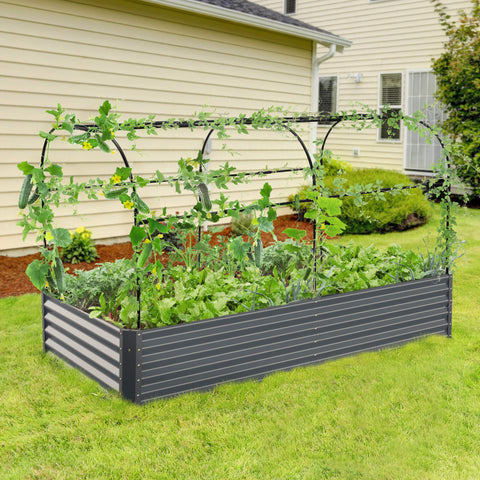
- Start with small, simple steps.
Taking care of these plants takes some time and effort. It's easy to get carried away with the enthusiasm of growing everything in the sun, but it's best to start with simple and small ones so you can care for each plant as much as possible.
- Create your garden with different plants
You don't have to limit yourself to growing vegetables or strictly herbs. Feel free to change it when it appears on your plants. Use these herbs to grow vegetables. Some plants are natural companions, and they don't always have the same flowers.
- Provide enough space for plants to grow properly.
Plants, like humans, have their own personal space. They want enough space to grow properly, because if other crops get too close, they stall and spread disease, unless they are companion plants.
- Composting is the best solution for your garden
Compost is a natural and organic solution that you can apply to your garden to support your plant growth. These can be eggshell powder, tea bags, coffee grounds, ashes, grass clippings, and clothing.
Adding these substances to the soil helps retain moisture, prevent pests and diseases, and promote healthy bacterial growth. Finding ways to reuse waste can often reduce your carbon footprint.
- Don't be afraid to use proper fertilizer - gardening tips
Even if you decide composting isn't your thing, you shouldn't overlook soil enhancement. Adding nutrients and minerals is an important step in fertilizing the land.
- Weed Removal - Gardening tips and tricks
Planting is just the beginning of the work in the garden. You must get rid of the weeds. Weeds are terrible for your garden because they compete with the plants you want to grow for nutrients in the soil and valuable space in your greenhouse.
- Mulch may be your closest companion - gardening skills
You may want to consider using mulch depending on what you are going to raise. Mulch helps to transport nutrients to the soil, which prevents soil erosion. Mulch can also help remove weeds from your new garden.
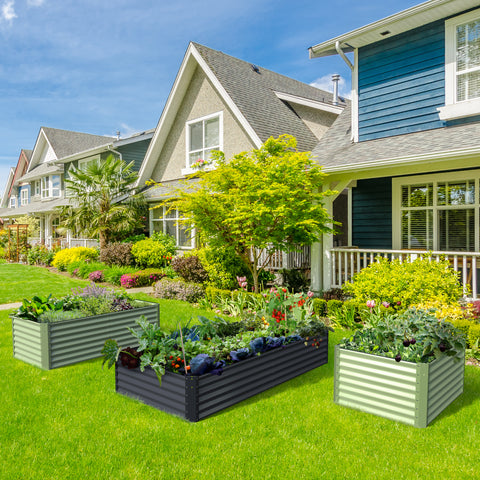
- Keep Watering needs in mind - Gardening Tips
Also, when planning your garden, how much water and how often each plant needs to be watered, make sure to suit what you want. Well water is necessary for plants to grow.
Just as fresh food keeps you from wilting in the sun, plants rely on good water nearby to stay healthy. In some places, your garden needs regular watering to keep plants healthy.
- Wait patiently for her beautiful garden.
Usually, good things take time. According to this, planting plants takes time, so stay calm and patient as your garden ebbs and flows.
- Organize Your Seeds - Gardening tips
To make sure the seeds stay neat and don't get lost or thrown away, find a way to store the seed packets properly. A clever option is to put them on the sleeve of a small picture book. That way, you can flip through the pages and see what you have and they're covered.
- Store Your seeds properly - Gardening tips
Keeping seeds alive requires proper storage. According to most studies, you want to keep the seeds at a constant temperature and humidity. Ideally, seeds should be stored at temperatures below 50 degrees Fahrenheit and humidity below 50 percent.
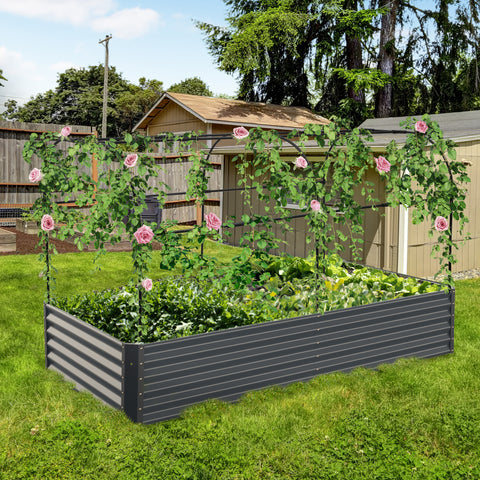
- Don't forget Crop rotation - Gardening tips
The way you grow has a big impact on the soil around you. Growing the same plants in the same place every year means you consume the same nutrients every year. Crop rotation can help replenish the garden soil.
Crop rotation can also keep common pests on edge, as their food supply changes from year to year. Instead of growing basil year after year, consider growing plants and flowers that you didn't know could be eaten.
conclusion
Your beautiful garden is a boon to the earth, with many advantages such as cost effectiveness, environmental protection, and superior pure nutrition. But gardening is becoming the first step in the natural evolution of the future. However, the suggestions above will help to make your garden more beautiful and useful.
Bottom line
So, I hope you have a clear understanding of "21 Simple Gardening Tips and Tricks"









